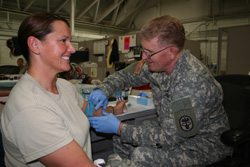Every year millions of Americans suffer from allergies, with symptoms ranging from irritating to life-threatening. TRICARE beneficiaries are eligible to receive care for the testing and treatment of conditions relating to allergies.
According to the National Institute of Allergy and Infectious Diseases, allergy symptoms are the result of inappropriate responses by the body’s immune system to normally harmless substances. Allergic reactions can be caused by airborne particles like dust or pollen, foods such as peanuts or an insect sting or bite.
Knowing what substance causes a reaction can improve quality of life for allergy sufferers and avoid unpleasant surprises down the road. An allergy to a common food ingredient like wheat can cause a variety of seemingly unrelated symptoms such as itchy rashes, nasal congestion or nausea. A parent doesn’t want to discover his or her child is allergic to bees only after they are stung.
Tests administered by allergists can identify most allergies. The most common allergy tests are either skin or blood tests. For some food allergies, an allergist will recommend an elimination diet to link certain foods to specific symptoms.
Once an allergy is diagnosed, beneficiaries can treat it with over-the-counter or prescription medications. Allergists sometimes recommend allergy sufferers change their behavior or diet to avoid an allergy-causing substance. An allergist also can prescribe a series of shots called immunotherapy, designed to gradually desensitize the immune system to a specific allergic trigger.
TRICARE covers prescription medication approved by the FDA and allergy treatments administered by allergists. However, beneficiaries are responsible for the cost of most over-the-counter medications. To see if a medication is covered by TRICARE, use the online formulary search tool, www.pec.ha.osd.mil.
TRICARE Prime beneficiaries must get a referral from their primary care manager to see an allergy specialist. There is no out-of-pocket cost for Prime beneficiaries who are active duty service members or their families to get testing at a TRICARE network provider. A low coypayment applies for retirees, their family members, former spouses and survivors on Prime. TRICARE Standard and other beneficiaries may get testing at any TRICARE authorized provider, but annual deductibles and cost shares apply. Out-of-pocket costs are lower at TRICARE network providers. At-home allergy testing products purchased over-the-counter are not covered by TRICARE.
TRICARE Prime beneficiaries must get a referral from their primary care manager to see an allergy specialist. There is no out-of-pocket cost for Prime beneficiaries who are active duty service members or their families to get testing at a TRICARE network provider. A low co-payment applies for retirees, their family members, former spouses and survivors on Prime.
TRICARE Standard and other beneficiaries may get testing at any TRICARE authorized provider, but annual deductibles and cost shares apply.Out-of-pocket costs are lower at TRICARE network providers. At-home allergy testing products purchased over-the-counter are not covered by TRICARE.
For more information about allergies, visit the NIAID online at www.niaid.nih.gov. Beneficiaries can get more information on the allergy services TRICARE offers and how to arrange care by visiting TRICARE’s website at www.tricare.mil/mybenefit/allergy.











